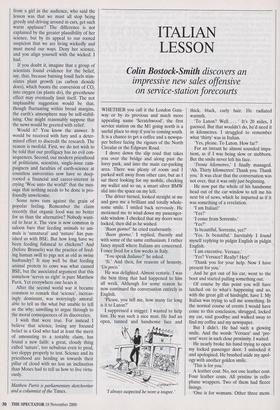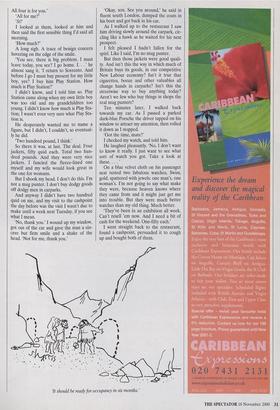ITALIAN LESSON
Colin Bostock-Smith discovers an
impressive new sales offensive on service-station forecourts
WHETHER you call it the London Gate- way or by its previous and much more appealing name `Scratchwood', the first service station on the Ml going north is a useful place to stop if you're coming south. It is a chance to get a coffee and a newspa- per before facing the rigours of the North Circular or the Edgware Road.
I drove down the slip road that takes you over the bridge and along past the lorry park, and into the main car-parking area. There was plenty of room and I parked well away from other cars, but as 1 sat there looking for my mobile, checking my wallet and so on, a smart silver BMW slid into the space on my left.
The driver turned, looked straight at me and gave me a brilliant and totally whole- some smile. I smiled back nervously. He motioned me to wind down my passenger- side window. I checked that my doors were locked, then did as he wished.
Iluon giomor he cried exuberantly.
`13uon giorno,' I replied, fluently and with some of the same enthusiasm. I rather fancy myself where Italians are concerned. I once lived for a few weeks in Italy.
`You speak Italiano?' he asked.
`Si.' And then, for reasons of honesty, Un poco.'
He was delighted. Almost ecstatic. I was the best thing that had happened to him all week. Although for some reason he now continued the conversation entirely in English.
`Please, you tell me, how many far long is it to Luton?'
I suppressed a snigger. I wanted to help him. He was such a nice man. He had an open, tanned and handsome face and `I always suspected he wore a toupee.' thick, black, curly hair. He radiated warmth.
`To Luton? Well. . ' It's 20 miles, I guessed. But that wouldn't do, he'd need it in kilometres. I struggled to remember what 'thirty' was in Italian.
`Yes, please. To Luton. How far?'
For an instant he almost sounded impa- tient, as if I was being slow or stubborn. But the smile never left his face.
`Trenta kilometres,' I finally managed. `Ah. Thirty kilometres! Thank you. Thank you.' It was clear that the conversation was not over, that it was only just beginning.
He now put the whole of his handsome head out of the car window to tell me his next bit of news, which he imparted as if it was something of a revelation.
`I am Italian!'
`Yes?'
`I come from Sorrento.'
`Yes?'
`Is beautiful, Sorrento, yes?'
`Yes. Is beautiful.' Inevitably I found myself replying to pidgin English in pidgin English.
`I am executive. Versace.'
`Yes? Versace? Really? Hey!'
`Thank you for your help. Now I have present for you.'
And he got out of his car, went to the boot and started pulling something out.
Of course by this point you will have latched on to what's happening and so, with the great gift of hindsight, have I. My Italian was trying to sell me something. In the normal course of events I would have come to this conclusion, shrugged, locked my car, said goodbye and walked away to find my coffee and my newspaper.
But I didn't. He had such a glowing smile. And the words `Versace' and 'pre- sent' were in such close proximity. I waited.
He nearly broke his hand trying to open my locked passenger door. I unlocked it and apologised. He brushed aside my apol- ogy with another golden smile.
`This is for you.'
A leather coat. No, not one leather coat. Four leather coats. All pristine in cello- phane wrappers. Two of them had fleece linings.
`One is for womans. Other three mens. All four is for you.'
`All for me?'
`Si!'
I looked at them, looked at him and then said the first sensible thing I'd said all morning.
`How much?'
A long sigh. A trace of benign concern hovering on the edge of the smile.
`You see, there is big problem. I must leave today, you see? I go home. I. . . ' he almost sang it, 'I return to Sorrento. And before I go I must buy present for my little boy, yes? I buy him Play Station. How much is Play Station?'
I didn't know, and I told him so. Play Station came along when my own little boy was too old and my grandchildren too young. I didn't know how much is Play Sta- tion; I wasn't even very sure what Play Sta- tion is.
He desperately wanted me to name a figure, but I didn't, I couldn't, so eventual- ly he did.
`Two hundred pound, I think.'
So there it was, at last. The deal. Four jackets, fifty quid each. Total two hun- dred pounds. And they were very nice jackets. I fancied the fleece-lined one myself and my wife would look great in the one for womans.
But I shook my head. I don't do this. I'm not a mug punter. I don't buy dodgy goods off dodgy men in carparks.
And anyway I didn't have two hundred quid on me, and my visit to the cashpoint the day before was the visit I wasn't due to make until a week next Tuesday, if you see what I mean.
`No, thank you.' I wound up my window, got out of the car and gave the man a sin- cere but firm smile and a shake of the head. 'Not for me, thank you.' `Okay, son. See you around,' he said in fluent south London, dumped the coats in his boot and got back in his car.
As I walked up to the restaurant I saw him driving slowly around the carpark, cir- cling like a hawk as he waited for his next prospect.
I felt pleased I hadn't fallen for the spiel. Like I said, I'm no mug punter.
But then those jackets were good quali- ty. And isn't this the way in which much of Britain buys its goods, in our competitive New Labour economy? Isn't it true that cigarettes, booze and other valuables all change hands in carparks? Isn't this the streetwise way to buy anything today? Aren't we few who buy things in shops the real mug punters?
Ten minutes later, I walked back towards my car. As I passed a parked dark-blue Porsche the driver tapped on his window to attract my attention, then rolled it down as I stopped.
`Got the time, mate?'
I checked my watch, and told him.
He laughed pleasantly. 'No, I don't want to know it really. I just want to see what sort of watch you got. Take a look at these. . „ ' On a blue velvet cloth on his passenger seat rested two fabulous watches, Swiss, gold, spattered with jewels: one man's, one woman's. I'm not going to say what make they were, because heaven knows where they came from and it might just get me into trouble. But they were much better watches than my old thing. Much better.
`They've been in an exhibition all week. Can't resell 'em now. And I need a bit of cash for the weekend. One-fifty each.'
I went straight back to the restaurant, found a cashpoint, persuaded it to cough up and bought both of them.
'It should be ready for occupancy in six months.'



































































































 Previous page
Previous page